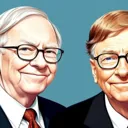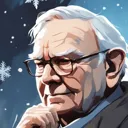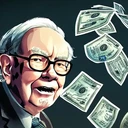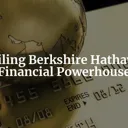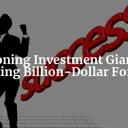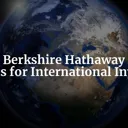Tags: Markel / Comments
This fanpage is not officially affiliated with Berkshire Hathaway: Disclaimer
Attention Berkshire Hathaway shareholders! Delve into the intricate unraveling of Berkshire's stake in Markel, the 'Baby Berkshire', and gain valuable insights into investment strategies, market reactions, and future outlooks. Learn from the giants, Warren Buffett and Tom Gayner, and navigate the complexities of the financial world with foresight and adaptability.
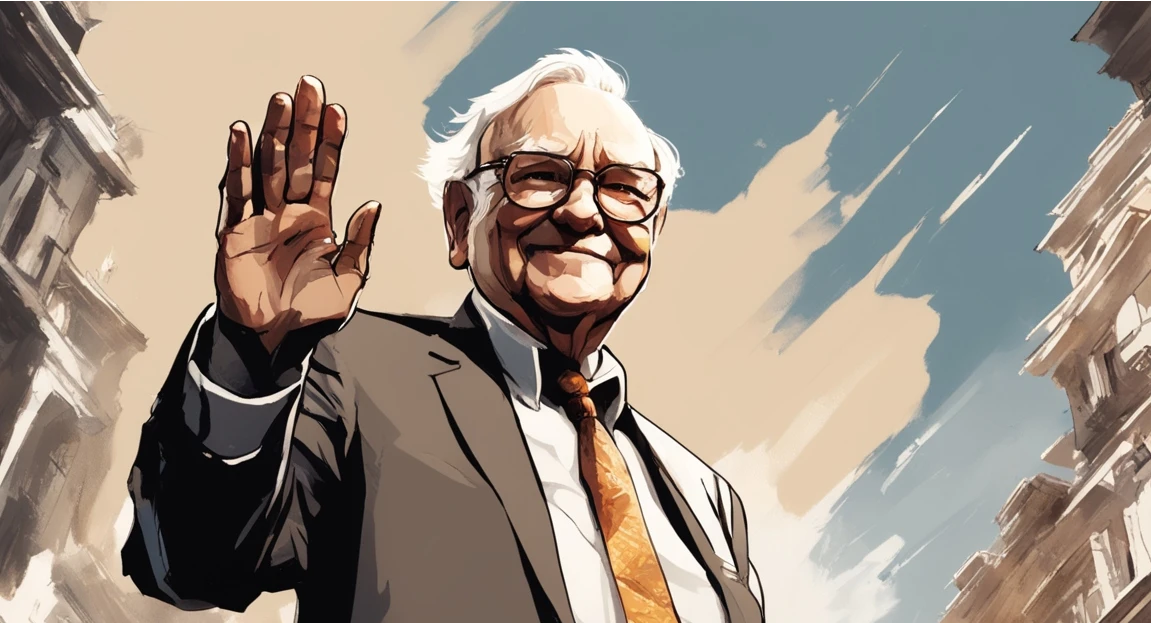
Introduction
In the intricate tapestry of the financial world, few names resonate with the clout and reverence afforded to Warren Buffett and his conglomerate, Berkshire Hathaway. Known for its sage investment decisions and an uncanny ability to foresee market trends, Berkshire Hathaway's moves are closely watched by investors and analysts alike. Among its portfolio, the Markel Corporation stood out, often dubbed the 'Baby Berkshire' for its similar business model and investment ethos 39. This resemblance was not merely superficial; it was rooted in a shared philosophy towards value investing and a diversified approach towards business operations. However, in a move that caught many by surprise, Berkshire Hathaway divested its complete stake in Markel in the fourth quarter of 2023, marking the end of a closely watched association. This article aims to delve into the intricacies of this decision, exploring the reasons behind Berkshire Hathaway's exit, the implications for both companies, and what this unraveling signals about broader market sentiments. By weaving together financial data, historical context, and expert insights, we promise a comprehensive analysis that sheds light on this significant investment shift.
The Rise and Alignment of Giants
The story of Markel Corporation is one of ambition, strategic foresight, and relentless expansion. Founded in 1930 as a small insurance company in Norfolk, Virginia, Markel underwent a transformative journey, culminating in its public offering in 1986. This milestone was just the beginning of a series of strategic expansions and acquisitions that propelled Markel into new markets and sectors, mirroring the diversification strategy that Warren Buffett famously employs at Berkshire Hathaway 5.
At the heart of Markel's ethos is Tom Gayner, the CEO whose investment strategy has drawn comparisons to Buffett's own. Gayner's approach, focusing on undervalued businesses with strong management, has been a cornerstone of Markel's success. This philosophy not only aligned with Buffett’s principles but also positioned Markel as a miniaturized reflection of Berkshire Hathaway, earning it the moniker 'Baby Berkshire' 39 ↗↗.
Warren Buffett's Berkshire Hathaway, with its storied history of lucrative investments and strategic acquisitions, has always placed a premium on companies boasting solid fundamentals and visionary leadership. It is this investment philosophy that led Berkshire to initiate a stake in Markel in the first quarter of 2022. The investment was seen as a testament to the mutual respect and shared philosophies between the two entities, marking a significant moment of alignment between two giants of the investment world 2.
Markel's business model, much like Berkshire's, spans across insurance, ventures, and investments. Its operations in the insurance sector, focusing on hard-to-place risks and operating in the excess and surplus (E&S) insurance market, complement Berkshire's own insurance operations, which include giants like GEICO and General Re 6. This synergy was further underscored by Markel's ventures into investments and acquisitions, mirroring Berkshire's diversified holdings approach.
Despite the challenges faced in 2023, particularly in its insurance operations, Markel reported a solid performance in its investing and ventures segments. The company's total operating revenues surged by 35.4% year-over-year to $15,804 million, with net income per diluted common share rebounding dramatically from a loss to $146.98. These figures, while impressive, also highlighted the undercurrents of struggle within the insurance sector, a point candidly acknowledged by Tom Gayner 1.
The investment by Berkshire Hathaway in Markel was not just a financial endorsement but a symbolic gesture, underscoring a deep-seated respect and a shared vision for value creation. This alignment of giants, both in philosophy and practice, set the stage for a partnership that many viewed as a long-term association. However, the unfolding events of 2023 would challenge this perception, leading to Berkshire Hathaway's complete exit from Markel, a decision that not only marked the end of an era but also signaled a strategic pivot in Berkshire's investment strategy amidst evolving market conditions.
The Unraveling: Berkshire's Exit from Markel
In the financial world, where investments are often seen as long-term marriages rather than fleeting romances, the dissolution of Berkshire Hathaway's stake in Markel, affectionately known as the 'Baby Berkshire', marked a significant chapter in 2023. Berkshire Hathaway, under the stewardship of Warren Buffett, began to trim its position in Markel in early 2023, culminating in a complete exit by Q4 2023 with the sale of 158,715 shares 12. This move was not merely a portfolio adjustment but a strategic retreat influenced by a cautious approach to an increasingly volatile stock market.
Here's the timeline of Berkshire Hathaway's Markel transactions based on stockcircle's overview 2 ↗:
| Action | Quarter | Shares | Avg closing price | Price range |
|---|---|---|---|---|
| New holding | Q1 2022 | +420 Thousand shares | $1,291.81 | $1,186.53 - $1,504.21 |
| Increased shares | Q2 2022 | +47.3 Thousand shares | $1,372.21 | $1,261.21 - $1,497.39 |
| Increased shares | Q1 2023 | +4.05 Thousand shares | $1,328.48 | $1,191.46 - $1,439.96 |
| Sold | Q3 2023 | -313 Thousand shares | $1,463.82 | $1,365.16 - $1,543.95 |
| Sold | Q4 2023 | -159 Thousand shares | $1,418.73 | $1,301.30 - $1,505.62 |
Warren Buffett's cautiousness in 2023 was evident in his decision to increase Berkshire's cash reserves to an all-time high of $157 billion by Q3/23, alongside trimming positions in other financial stocks such as New York Mellon Corp and U.S. Bancorp 1. This cautious stance can be attributed to a broader market valuation concern, with financial stocks trading at low valuation multiples, and intrinsic value calculations suggesting undervaluation for companies like Markel 1. Despite these valuations, Buffett's decision to exit Markel was likely influenced by the company's disappointing performance in its insurance business, as acknowledged by Markel's CEO, Tom Gayner 1.
The implications of Berkshire's divestiture from Markel are multifaceted. For Markel, this move could affect market perception and stock performance, raising questions about strategic considerations moving forward. The investment community and analysts have speculated on the reasons and timing of the sale, considering it a significant indicator of Berkshire Hathaway's investment strategy and portfolio adjustments 4 ↗. This divestiture, set against the backdrop of Berkshire's broader portfolio strategy, including reducing holdings in companies like Apple and increasing stakes in Chevron and Occidental Petroleum, reflects a nuanced approach to navigating the current economic landscape 4.
Comparative Analysis: Berkshire Hathaway vs. Markel Post-Divestiture
Following Berkshire Hathaway's divestiture from Markel, a comparative analysis of both companies reveals differing trajectories and strategic outlooks. Financially, Berkshire Hathaway has maintained a robust position, with a 20% annual compound return since the 1960s and a valuation at 1.9 times tangible book value (TBV) 6. In contrast, Markel, specializing in hard-to-place risks in the excess and surplus (E&S) insurance market, holds a valuation of about 2 times TBV 6. Despite Markel's solid performance in investing and ventures in fiscal 2023, its insurance business's underperformance has been a point of concern 1.
Strategically, Berkshire Hathaway's divestiture from Markel could be seen as part of a broader realignment, focusing on investments with clearer paths to value creation. Berkshire's recent acquisition of Alleghany Corp. for $11.6 billion in 2022 underscores its ongoing commitment to expanding its insurance and reinsurance operations, which include GEICO, General Re, Berkshire Hathaway Reinsurance, and National Indemnity 6. This move contrasts with Markel's current challenges in the insurance sector and the need for strategic adjustments to navigate a turbulent market.
The sale's impact on Markel's stock price and investor sentiment cannot be understated, with market data and expert opinions suggesting a period of reassessment for Markel. However, both companies are positioned to leverage their respective strengths amidst current economic challenges. Berkshire Hathaway's cash reserves and recent portfolio adjustments indicate a strategic posture ready to capitalize on market opportunities 4. Conversely, Markel might adjust its strategy to address its insurance business's shortcomings and explore new growth avenues.
The legacy and influence of Warren Buffett and Tom Gayner within their respective companies continue to shape their strategic directions. Buffett's cautious yet opportunistic investment philosophy contrasts with Gayner's approach at Markel, emphasizing long-term value creation through diverse operations 78. As both companies navigate the post-divestiture landscape, their moves will offer valuable insights into investment strategies and market dynamics.
In conclusion, Berkshire Hathaway's exit from Markel signifies more than a portfolio adjustment; it reflects a strategic recalibration in response to market conditions and internal performance metrics. As both companies chart their paths forward, the investment community will closely watch, gleaning lessons from these giants of industry.
Lessons from the Giants: Investment Insights and Strategies
The divestiture of Berkshire Hathaway's stake in Markel, often dubbed the 'Baby Berkshire,' offers a rich tapestry of investment insights and strategies that can benefit investors of all stripes. At the heart of this unwinding is a masterclass in risk management, portfolio diversification, and market timing—all underscored by the investment sagas of Warren Buffett and Tom Gayner.
Risk management emerges as a pivotal lesson, especially when considering Berkshire Hathaway's cautious approach in 2023. The company's decision to increase its cash and short-term investments to an all-time high of $157 billion reflects a strategic move to mitigate risk amid market uncertainties 1. This approach, emphasizing the importance of having a buffer during volatile times, is a page that every investor should bookmark.
Portfolio diversification is another critical takeaway. Despite the allure of Markel's solid performance in investing and ventures in fiscal 2023, Berkshire Hathaway's choice to trim and eventually exit its position underscores the principle of not putting all eggs in one basket. This move, particularly in a year when Berkshire also adjusted its stakes in other companies, highlights the importance of spreading investments across sectors and assets to manage risk effectively 4.
The concept of market timing, while often debated, plays a role in Berkshire Hathaway's strategy. The sale of Markel shares came after a period of holding and slight reduction, suggesting a strategic exit aligned with Berkshire's assessment of the market and Markel's intrinsic value. This decision, reflective of a broader cautious stance in 2023, underscores the significance of exiting or entering positions based on thorough market analysis and future outlooks 1.
Central to both companies' strategies is a deep commitment to fundamental analysis and long-term value investing. This approach, championed by Buffett and mirrored by Gayner, focuses on the intrinsic value of companies, considering their financial health, market position, and growth prospects. Markel's performance in 2023, with a notable turnaround in net income and solid investment income, underscores the potential rewards of this investment philosophy, despite the challenges in its insurance business 1.
Leadership and management quality also play a crucial role in investment decisions. The reputations and strategies of Tom Gayner and Warren Buffett, both known for their dedication, work ethic, and ability to surround themselves with talented individuals, are testament to the impact of strong leadership on a company's success and, by extension, its attractiveness to investors 78.
For individual investors looking to draw lessons from these giants, the advice is clear: exercise patience, conduct thorough research, and focus on quality. The investment philosophies of Buffett and Gayner, emphasizing long-term value over short-term gains and the importance of understanding what you invest in, offer a blueprint for building a resilient and profitable investment portfolio.
Finally, the impact of market conditions and economic indicators on investment decisions cannot be overstated. Berkshire Hathaway's cautious stance in 2023, driven by concerns about the stock market and the broader economic outlook, serves as a reminder of the importance of being attuned to external factors that can influence investment outcomes 1.
Market Reactions and Future Outlook
The market's immediate reaction to Berkshire Hathaway's sale of Markel shares was marked by a mix of surprise and speculation. Analysts and investors closely watched the stock price movements, seeking to understand the implications of this significant divestiture. While the short-term impact saw some fluctuation in Markel's stock price, the long-term outlook remains more nuanced.
The broader implications for the financial sector and insurance industry are significant, given the challenges highlighted by Markel's performance in its insurance business. This move by Berkshire Hathaway may signal a cautious outlook on the insurance sector, potentially influencing other investors' perceptions and strategies 1.
Looking ahead, the future trends in the insurance market may see companies like Markel adapting to changing conditions through innovation in products and services, as well as improving operational efficiencies. For Berkshire Hathaway, the future investment strategy appears to be leaning towards a more conservative approach, with a focus on increasing cash reserves and investing in sectors with perceived stability and growth potential, as evidenced by its increased stakes in Chevron and Occidental Petroleum 4.
Potential acquisition targets for both Berkshire and Markel will likely align with their strategic priorities and market conditions. For Berkshire, companies with strong cash flows, low debt, and potential for steady growth in sectors like energy and technology could be attractive. Markel, on the other hand, might seek opportunities to bolster its insurance and investment arms, possibly focusing on acquisitions that offer synergies and enhance its competitive edge.
The possibility of future collaboration or investment between Berkshire Hathaway and Markel cannot be entirely ruled out, given the mutual respect between Buffett and Gayner and their shared investment philosophies. However, the divestiture might also mark a permanent shift in their relationship, with each entity pursuing its distinct strategic path.
As for the broader economic outlook for 2024, factors such as market valuations, interest rates, and global economic indicators will play a critical role. Investors and companies alike will need to navigate these dynamics carefully, balancing risk management with the pursuit of growth opportunities in a potentially volatile market environment.
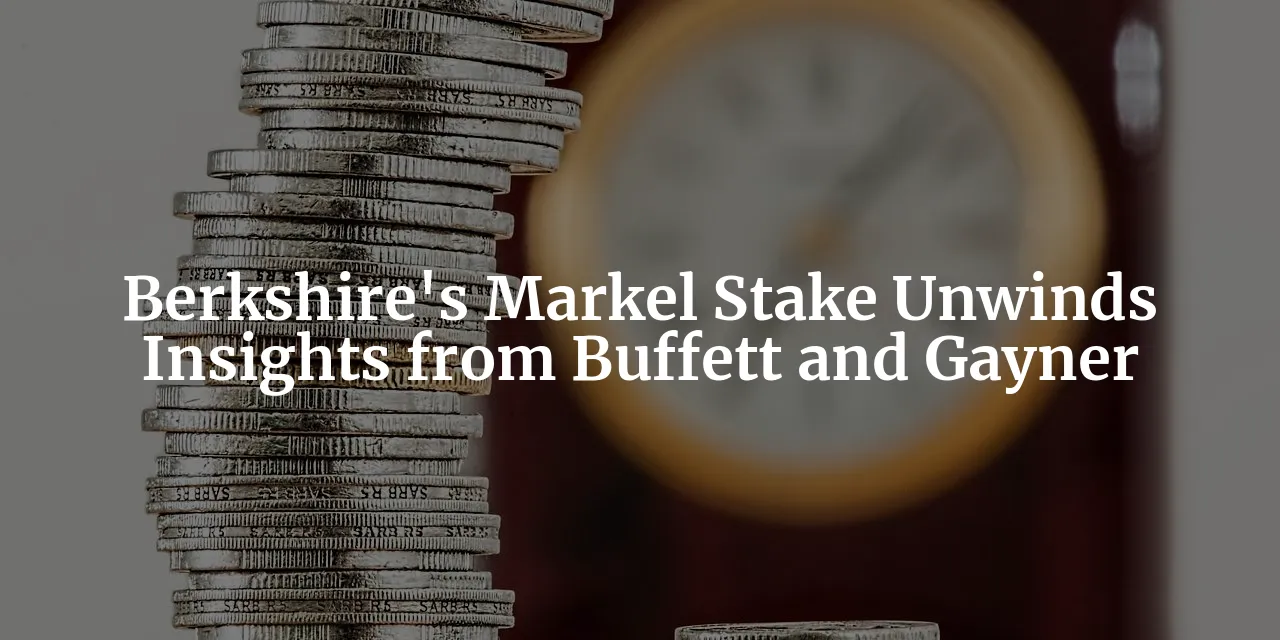
Conclusion
The unwinding of Berkshire Hathaway's stake in Markel marks a remarkable chapter in the annals of investment history, offering a wealth of insights and lessons for shareholders and market observers. This move, which saw the 'Baby Berkshire' part ways with its namesake, reflects a strategic recalibration in response to market conditions and internal performance metrics. As both companies chart their paths forward, the investment community will closely watch, gleaning lessons from these giants of industry.
Reflecting on the enduring lessons from Warren Buffett and Tom Gayner's investment philosophies, it becomes evident that the principles of value investing, risk management, and strategic leadership remain as relevant as ever. The cautious approach taken by Berkshire Hathaway in 2023, with a focus on increasing cash reserves and trimming positions in companies like Markel, underscores the importance of patience, thorough research, and a focus on quality for individual investors. The investment philosophies of Buffett and Gayner, emphasizing long-term value over short-term gains and the importance of understanding what you invest in, offer a blueprint for building a resilient and profitable investment portfolio.
The future of both Berkshire Hathaway and Markel holds a myriad of possibilities. Berkshire Hathaway's strategic posture appears ready to capitalize on market opportunities, with a focus on sectors with perceived stability and growth potential. Markel, on the other hand, might adjust its strategy to address its insurance business's shortcomings and explore new growth avenues. The potential for future collaboration or investment between the two entities cannot be entirely ruled out, given the mutual respect between Buffett and Gayner and their shared investment philosophies.
The unwinding of Berkshire Hathaway's stake in Markel offers valuable lessons and insights into investment strategies, market reactions, and future outlooks. As both companies navigate the post-divestiture landscape, the enduring principles of value investing, risk management, and strategic leadership will continue to shape their paths. The investment community, too, will continue to draw lessons from these giants, applying the insights gained from this analysis to their investment strategies and decision-making processes. The dynamic and ever-evolving nature of the investment world is a reminder that even the most storied relationships can undergo significant changes, and it is the adaptability and foresight of investors that will ultimately steer them towards success.
References
-
Markel: Listening To Warren Buffett And Being Cautious - seekingalpha.com ↩↩↩↩↩↩↩↩↩↩↩
-
Warren Buffett: 5 Markel Group transactions (Berkshire Hathaway / MKL) - stockcircle.com ↩↩↩
-
Five Wildly Successful Value Investors - www.investopedia.com ↩↩
-
Berkshire Hathaway’s Fourth Quarter 2023 Portfolio Moves - www.forbes.com ↩↩↩↩↩
-
Markel Group - Wikipedia - en.wikipedia.org ↩
-
Better Buy: Berkshire Hathaway or Markel? - www.nasdaq.com ↩↩↩↩
-
Tom Gayner: What Makes Warren Buffett Great - acquirersmultiple.com ↩↩
-
Thomas Gayner - www.coca-colacompany.com ↩↩
-
Not to be confused with Berkshire Hathaway Class B shares, which have also been termed 'Baby Berkshire', see 'The Evolution of BRK-B: From 'Baby Berkshire' to S&P 500 Inclusion' ↗ ↩↩



